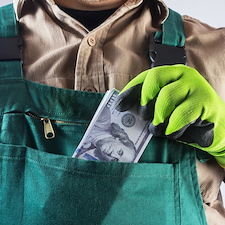Google Wants To Get Rid Of Sites That 'Feel Made For Search Engines'


Google has officially announced its plans to enhance Google Search quality by eliminating spammy, low-quality content in a targeted core algorithm update. This update is already underway as of March 5th, 2024 - and may take up to two weeks to complete.
They call this a continuation of Google's "Helpful Content Update," but what makes this message different, and should you be worried about your website and contractor marketing tactics online?
A History Of Google's "Helpful Content" Goals
The previous "Helpful Content" core update—initially released in 2022—sought to promote more authoritative voices and uniquely authentic content over the endless repetition of content without analysis or opinion.
Around the same time "Helpful Content" was being pushed out, Google expanded its E-A-T concept for search quality rater guidelines to expand upon their original Expertise, Authoritative, Trust model. They had expanded it to E-E-A-T, adding Experience to create the Experience, Expertise, Authoritativeness, and Trustworthiness model that it is today.
What The Heck Does E-A-T Or E-E-A-T Have To Do With My Website?
Technically, E-E-A-T is not a direct ranking factor. It's a guideline used by search quality raters.
Search quality raters are the people (and sometimes AI) that evaluate the quality of changes in search engine algorithms.
So, if search quality raters are supposed to use E-E-A-T as a guideline to determine how well the algorithm is working, and search engine algorithms deliver results that adhere to E-E-A-T policies to be positively evaluated by search quality raters…
That suggests it is worth it to pursue demonstrating your experience, expertise, authoritativeness, and trustworthiness in your online marketing efforts.
Some of the criticism that Google receives is about the nature of E-E-A-T (sometimes called "Double-E EAT" when read aloud), saying that smaller independent sites tend to get drowned out by larger, more popular organizations and publications with more documented authority than others by the very nature of what they do
I Don't Understand - So Do I Need To Worry About E-E-A-T Or Not?
We know it's a lot, and it is a fairly technical distinction.
E-E-A-T is a ranking signal. It's not a specific measured metric that ensures you will rank if you attain high levels of E-E-A-T quality.
But sites that follow E-E-A-T tend to be what Google's algorithm rewards with improved ranking.
At the end of the day, the short version is…
Establish your website and online marketing presence to demonstrate that you are an expert who can be trusted. This will probably help people and Google like you a little more.
What's Different About March 2024's Even More Helpful Content Update?
While Google mentions very specific spam types that it will tackle, including expired website spam and obituary spam, the more in-depth story is that three specific new spam policies have been published in response to recent trends of increased spam and decreased search quality.
Expired Domain Abuse
Contractors won't really have to worry about the expired domain abuse spam policy.
It involves purchasing a recently expired domain and trying to piggyback on that domain's previous reputation - even if it were in a completely different field of expertise.
It would be like if an electrician bought a recently expired domain used by a local restaurant and then stuffed it full of electrician content, hoping to get search engine exposure by riding the coattails of the previous restaurant's SEO success.
We don't do that - and you shouldn't either.
Site Reputation Abuse
Site reputation abuse is another one that contractors won't have to really worry about.
This is targeted at larger publications and content aggregators that sell space on their websites as advertising. But instead of placing a graphic ad, those publications sell space for an editorial-type article.
The issue with these so-called "advertorials" is that, from a reputation and E-E-A-T standpoint, the larger publication appears to be the speaker.
Google's concern isn't format, but rather...
- The disconnect between the publication's main area of focus where they hold authority and
- The lack of oversight or editorial control over such third-party content.
It would be like if Footbridge Media sold space and allowed third-party authors to publish content about medical device reviews. As a marketing and advertising site, it wouldn't make sense for completely unrelated individual page content about medical devices to perform well because of the overall site-wide optimization success.
Footbridge Media doesn't engage in that type of content on its own or on behalf of our clients, so this won't impact our contractors at all.
Scaled Content Abuse
This could be problematic for companies that are outputting content at a large scale without editing and oversight. It calls out companies that use AI or automated scraping and writing methods to create content that does not have redeeming value for a reader.
Google isn't flatly suggesting that AI in content creation will be considered spam.
It explicitly states that automated or human-written content is problematic spam when it doesn't "add value to users."
For example, if you're using AI to assist with preparing content when putting together a Project Post - that can be done in a way that helps add value to users. When content is prepared using good prompts based on worthwhile talking points and demonstrates the benefits of a service to a potential customer and their property should they choose to do the same – that provides value to a user.
On the other hand, if you're copy-and-pasting a single city page over and over again so you can make a "City page" for every single zip code in your state without any oversight or added input to suggest why your service fits that zip code well – that may be considered a more spammy way to go.
Footbridge Media strives to generate valuable content for each and every site. Keep your content focused on what authentically serves, informs, and educates your customers instead of worrying about writing as many pages as possible for quantity's sake alone.
What Footbridge Media Thinks Of These Updates And How They Impact Contractors
This is another instance of Google suggesting that "search engine first" content is not the goal. Instead, they know that users want to be led to content that answers their questions and addresses their needs. Searchers don't just want the most authoritative regurgitation of the same story over and over again.
The key here is that "search engine first" differentiation - To be clear, that does not mean it is wrong to create content in a smart way that takes into account search engines.
Google is still saying that content is king - but it's just being more particular about what makes good content. The difficulty here is how Google defines and interprets adding user value.
As good as Google is getting, Google still isn't necessarily reading and comprehending content. As highlighted in a SearchEngineLand article that summarizes some documents and slides released as part of Google's antitrust trial - Google's expertise in ranking is less about reading the content and more about recognizing patterns around how people interact with content.
Google's final slide in that section simply states "When fake understanding fails, we look stupid."
These new spam policy definitions are in response to recent failings in Google's spam-fighting systems.
How To Handle Your Content Creation Moving Forward
As people continue to game and exploit the system, Google will continue to bob and weave and make these types of updates.
But still - the through line about what Google wants remains largely unchanged: Create valuable content that helps users.
While Google figures out that balance and tries to better understand content and how to understand authority and expertise even if it comes from a smaller company or less prolific website, our recommendation is to continue moving forward with the type of content that best serves your prospective customers in the long run. Trying less-than above board tactics that will not have longevity in your marketing efforts.

About Chris Lonergan
Chris Lonergan has over 13 years of contractor marketing experience with Footbridge Media. With a background in web design, print design, content creation, and online marketing, Chris is focused on providing quality marketing and business solutions in the construction and service industries - helping small business owners to more efficiently manage their companies and grow their operations.
Chris Lonergan has previously contributed to and/or been featured in PM Magazine (Plumbing & Mechanical | Contractors x Engineers), theNEWS (ACHR - Air Conditioning | Heating | Refrigeration), Turf Magazine (For Landscaping and Green Industry Professionals) Service Roundtable's blog, inPAINT Magazine, the SMB Marketing Agency Show, and the Green Industry Podcast. Chris is also a past SGI/CertainPath breakout session presenter.





